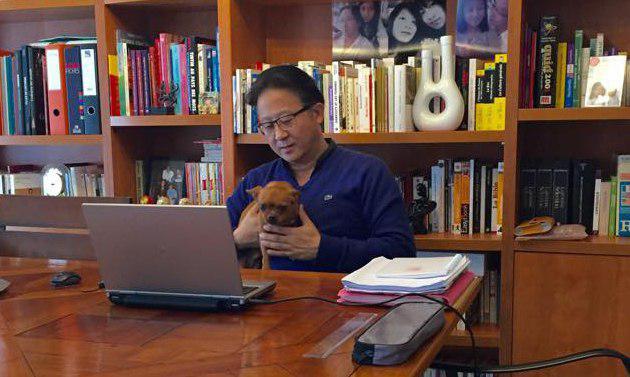Phnom Penh (FN), Feb. 12 - Jean-François Tain, managing director of the Radio France International (RFI) and a well-known analyst for international political news, wrote an article “What are Cambodia’s interests in the early 21st century?” on his Facebook on Monday as follows:
The world in the early 21st Century and during the Cold War era (1947-1991) are completely different. Khmer should not be confused with these eras.
During the cold war, ideology was the core of international relations. However, in the early 21st century, economics is more important than ideology, politics, human rights. As former Chinese leader Deng Xiaoping has said since the late 1970s, “It doesn’t matter if a cat is black or white; as long as it catches mice, it’s a good cat.”
That is why the United States with free-trade policy conducts businesses with Chinese communism, while Democratic European Countries do businesses with Asia’s Authoritarian Countries. In contrast to the Cold War, the West has no relationship with the communist countries, which is why Brazil or South Africa or India, and the European Union or ASEAN appear to be major economic regions.
Khmer must not be confused to understand the current geopolitics with the old ideas of the Cold War era. During the Cold War, there were only two poles; one is Western Bloc, known as “liberal”, which was against another one, the communist Soviet Union.
In the early 21st century, the multilateralism of the world was a reality that the U.S refused to recognize, even though it caused the U.S to lose their hegemony. In addition, the multilateralism also caused the Western Europe to lose its solidarity, meaning that the U.S, European democratic countries, Canada and Japan do not identically reacted as back in the Cold War era.
In the current world, the word "neutral Cambodia" is an outdated word. We should say “Cambodia does not treat anyone as an enemy”. In this sense, if Cambodia is close to China, it does not mean Cambodia is the U.S’s enemy. If Cambodia does not get the attention from the U.S, it does not mean that every European or Asian democratic countries like Japan, India, South Korea or Indonesia does not value relations with Cambodia.
Khmer must understand that in the early 21st century, world and regional powers are trying to strengthen their individual influence in their respective territories, with special emphasis on economic and trade. Meanwhile, Cambodia must not hesitate to take advantage of contests between the U.S and China, the U.S and Russia, Russia and China, China and Japan, China and India or between China and Vietnam.
Finance has no ideology, no dictatorship or democracy, especially when Cambodia needs it to build national infrastructures. In short, what must have been Cambodia's first priority in international relations in the early 21st century is economic interests, as Cambodia aims to become “Tiger of Economy” to gradually improve its independence.
However, democracy should also be a significant goal for Cambodia, which should be parallel to economic development. In fact, China, Vietnam, Laos, Thailand, Malaysia, Singapore and so on are examples clearly show that democracy is not an essential factor for economic development, but democracy is required to develop a country with quality and balance for the sake of national interests rather than groups’ or individuals’ interests.
Democracy, through the rule of law, can reduce corruption, punish without discrimination of any legal offenders, and can clearly distinguish between nation’s and individual’s property, and distinguish leaders who can thrive or destroy the nation.
However, democracy is not the root of a political system that must be imported from the West and cultivate coercively in a country's territory to be fruitful. This idea was introduced by the U.S in Iraq in 2003. For Bush, the U.S was willing to use every methods to combat the widespread of the democracy to the world, especially in the Middle East, and the regime of Saddam Hussein in Iraq, which was the first to be overthrown. Until today, Iraq not only has not experienced democracy, but also lost stability and peace.
In Asia, so far, only two countries, Japan and Cambodia, have been the laboratory for democracy test imported from the west. Other Asia’s democratic countries, such as Taiwan, South Korea, the Philippines and Indonesia, have stepped out from military dictatorship by their themselves to embrace democracy.
Cambodia was an obvious example that a lack of internal willingness, the excessive enthusiasm, and force from external pressure can backward democracy, while Japan after WWII, forced by the U.S had successfully transformed from dictatorship to Western democracy.
Japan's successful transition was a special case. Japan after World War II was under recovery and had no other options besides accepting the U.S’s pressure to exercise peaceful constitution, which caused this Asian nation to lose its independence and power until today.
To achieve democracy, Cambodia needs time and the internal reintegration rather than external pressure. Internal reintegration means the willingness of leaders, responsible opposition leaders, civil society organizations and media that know their roles and educated citizens. External pressure, however, could ultimately drive Cambodia to backward democracy.
For democracy in Cambodia to succeed, it requires some "khmerism" characteristics through paying attention to Cambodia's cultural and historical traditions. For instance lèse-majesté law is mandatory, as it is unacceptable to insult the King, in contrast to the Western tradition, which with freedom and principle of democracy, people can even curse divine. Similarly, the history of Cambodia, since the 1970s, has shown an upheaval in times of political turmoil. It requires the ruling party and the opposition to hold dialogue rather than compete with each other through protests and demonstrations as in Western world like an old saying, “When ever the water rises the fish eat the ants and whenever it’s dry the ants eat the fish”.
=FRESH NEWS
